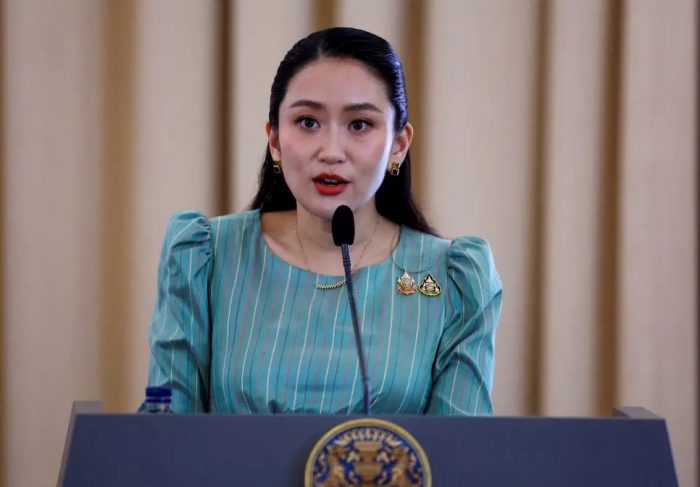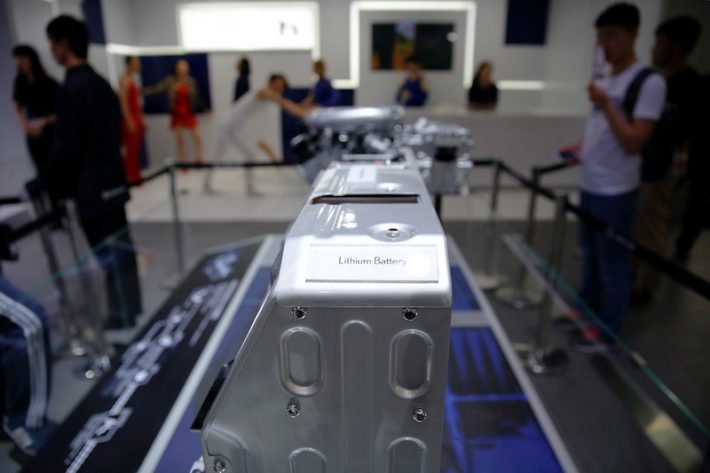Thailand’s long-running political upheaval continued on Friday when the Constitutional Court dismissed Paetongtarn Shinawatra, the daughter of Thaksin, the controversial former PM, as premier.
Paetongtarn, 39, who was the country’s youngest prime minister, held the top office for just over a year, although her father was widely regarded to have been guiding the government’s work.
The court said Paetongtarn breached ethical norms by putting private interest ahead of national interest. Her actions damaged the reputation of the country and caused the public to lose confidence in her, it said.
ALSO SEE: Japan Wants Issues Sorted Before Trade Rep Seals Big Tariff Deal
The ruling was no surprise, coming after the revelation of a controversial phone call she had with former Cambodian leader Hun Sen in June.
On July 1, a court suspended her from carrying out any duties as Thailand’s prime minister following the leaked phone call. Shortly after, Paetongtarn made a public apology and asked for forgiveness.
“I didn’t want anything for myself. I was only thinking about how to avoid fighting and avoid bloodshed… I have no ill intentions,” she told reporters, referring to the call with Hun Sen, which sparked political uproar and failed to avoid a five-day border war in late July, in which a large number of Cambodian troops were believed to have been killed.
A political novice with no government experience, Paetongtarn took power last August after her predecessor, Srettha Thavisin, was expelled from office in a shock decision by the same court.
Her main qualification was simply being the daughter of Thaksin, a polarising billionaire who has loomed over Thai politics for a quarter of a century.
Six Shinawatra leaders ousted
With Paetongtarn’s unceremonious exit, six prime ministers either from the Shinawatra clan or appointed by the family have been pushed out of power by court decisions or military coups over the past two decades, underlining lingering concerns about corruption and Thaksin’s long tussle with the country’s conservative establishment.
Although popular at the start of her term, with 31% of respondents nationwide backing her as the top prime ministerial choice in September 2024, Paetongtarn’s standing nosedived to 9.2% by June, according to the National Institute of Development Administration’s surveys.
In the end, her undoing was a leaked recording of a call with Hun Sen in June, in which she appeared to be subservient to the veteran Cambodian politician and criticised a popular Thai general, which drew an immediate public backlash.
A petition filed to the Constitutional Court by 36 senators accused Paetongtarn of dishonesty and breaching ethical standards, leading initially to her suspension and today, her dismissal from office.
A tense troop buildup along the 800km Thai-Cambodian frontier ultimately led to a five-day conflict involving fighter jets and artillery barrages, the worst fighting between the neighbours in over a decade.
Two moves praised by NGOs
Paetongtarn attended Chulalongkorn University in Bangkok and Britain’s University of Surrey, then got involved in the Shinawatra family’s businesses, before entering politics in 2023 to lead the Thaksin-backed Pheu Thai party.
On the campaign trail, a heavily pregnant Paetongtarn evoked the nostalgia of previous Shinawatra-led administrations and promises of big-ticket reforms to woo millions of working-class voters.
Pheu Thai finished second in the polls but managed to secure a parliamentary majority to form a government after the election-winning Move Forward party was blocked from taking power by a court ruling.
That allowed Srettha to become prime minister, followed by Paetongtarn, who failed to deliver on her party’s big electoral promises, including firing up a sluggish economy and completing a flagship ‘digital wallet’ handout programme that has now been put on ice.
Her recent time in office featured two moves that were lauded by rights and humanitarian groups. The first was a policy to fast-track citizenship and legal status to close to half a million stateless hilltribe people and long-term ethnic residents, mainly in the country’s north, reducing processing time from many years to just a handful of working days.
The second, earlier this week, was allowing long-term refugees – ethnic Karen and others – who have lived in nine camps near the Myanmar border since the mid-80s, to work outside the camps. That was a desperately required solution after the Trump administration shut down USAid and terminated assistance that provided food and health services for the 80,000 or so refugees in recent months.
The short border war with Cambodia and reports of Khmer workers being attacked in Thailand reportedly led to hundreds of thousands – possibly half a million migrant workers fleeing home to Cambodia. That created a serious shortage of cheap labour that the Thai government is now seeking to deal with.
A significant labour shortage in agriculture, manufacturing and services was a factor in allowing the displaced Myanmar refugees to work in Thailand’s border provinces, and it may also help the many thousands of young men and women who have fled forced conscription in Myanmar.
Thailand, which is Southeast Asia’s second-largest economy, has been hit by a wave of negative impacts this year. They include the increasingly severe slowdown in China, plus the move by Chinese criminal networks to set up scam centres in Myanmar, Cambodia and northern Laos in recent years, which has reportedly deterred some tourists from China, while also bolstering Thailand’s ‘grey’ economy.
Indeed, the Thai baht has remained surprisingly buoyant despite the country’s economic slowdown, which has caused some analysts to speculate that ‘grey’ money from scam centres or laundered from neighbouring countries is a factor in why the Thai currency has surged 11% over the past year.
Another ‘black swan’ event that rocked the normally thriving Thai tourist sector was the 7.7 earthquake in central Myanmar in late March, which caused the collapse of a 30-storey building in Bangkok. The tragedy also had serious impacts on the local property sector.
Focus on Thaksin’s hospital case, next PM
But now the key questions are whether Thailand faces another period of political turmoil, and who the next prime minister might be.
Deputy Premier Phumtham Wechayachai and the current cabinet will oversee the government in a caretaker capacity until a new prime minister is chosen by parliament, on a date to be decided by the House Speaker. The constitution does not specify a timeframe for when the lower house must convene.
The court ruling opens the door to dealmaking and horse-trading between parties and other powerbrokers, with Thaksin, the 76-year-old founder of Pheu Thai Party, likely to be the central figure. With many competing interests, the process could take time.
However, some analysts say this could be the end of the Shinawatra dynasty, because while Thaksin was last week acquitted of a case of lese majeste (defaming the monarchy), he still faces another court case relating to his return to Thailand in 2023, after 16 years in self-imposed exile.
After his return in August 2023, Thaksin went immediately to a court in Bangkok, where an alleged deal unfolded. In a quick hearing, he pleaded guilty, after being sentenced in absentia to eight years on corruption charges. He was sent to jail to serve his sentence, but on the very first night, he was transferred to a police hospital on medical grounds.
He spent six months in a plush room on the top floor of the Police Hospital, before being released on parole. His term was also reduced by King Maha Vajiralongkorn to one year.
Next month, the Supreme Court is due to rule on whether there were solid grounds for Thaksin’s long stay in the hospital VIP suite. Doctors have claimed his condition was not serious. That case could see him sent back to prison, or flee again, if he has not done another deal with ‘elite’ powerbrokers.
PM candidates, future still cloudy
The ruling coalition holds a thin majority of just seven seats, meaning any shifts in allegiance away from the alliance could be costly for Pheu Thai and the Shinawatra political dynasty.
Eligible candidates to become PM include Chaikasem Nitisiri, 77, a former justice minister and attorney general who has kept a low profile, and Anutin Charnvirakul, 58, an ambitious former interior minister and deputy premier whose Bhumjaithai party quit Paetongtarn’s coalition in June.
Outsiders include Energy Minister Pirapan Salirathavibhaga, former deputy prime minister Jurin Laksanawisit, and ex-premier Prayuth Chan-ocha, a general who led a 2014 coup against the last Pheu Thai government. Prayuth, 71, is retired from politics and is currently a royal adviser.
The chances of Pheu Thai retaining the premiership through Chaikasem will depend largely on whether Thaksin still has an accommodation with Thailand’s conservative establishment, which has far-reaching political influence and could easily torpedo his plans.
While the old guard has a troubled history with Thaksin, some analysts say they may see him as the lesser of two evils. A weakening of Thaksin’s power could lead to an early election and open the door to the People’s Party, a progressive and hugely popular opposition, formerly known as Move Forward, with an institutional reform agenda that threatens the interests of conservatives and the royalist military.
Anutin would need support from within the coalition he fled and from the People’s Party, the largest force in parliament, which has signalled it may back him if he commits to an early election.
- Jim Pollard with Reuters
ALSO SEE:
Political Upheaval Seen Hitting Thailand’s Sluggish Economy
Woes From Myanmar’s Catastrophic Civil War Spilling into Thailand
Cambodian Scam Centres Straining Ties With States Near And Far
Chinese Builder Linked to Bangkok Tower Collapse Under Scrutiny
Srettha is New PM in Thailand After Thaksin Returns to Jail
Top Court Dissolves Thailand’s Most Popular Political Party
Rush for Thailand’s $14-Billion Handout Scheme Hit by Glitches
Thai Economy Rocked by Factory Closures, Cheap Chinese Imports
Thai Task Force to Help Stop Arms Funding For Myanmar Military
Scamming Compounds in SE Asia Stole $64 Billion in 2023: Report
Shadow of Thailand’s Military Hangs Over Latest Election Win
























